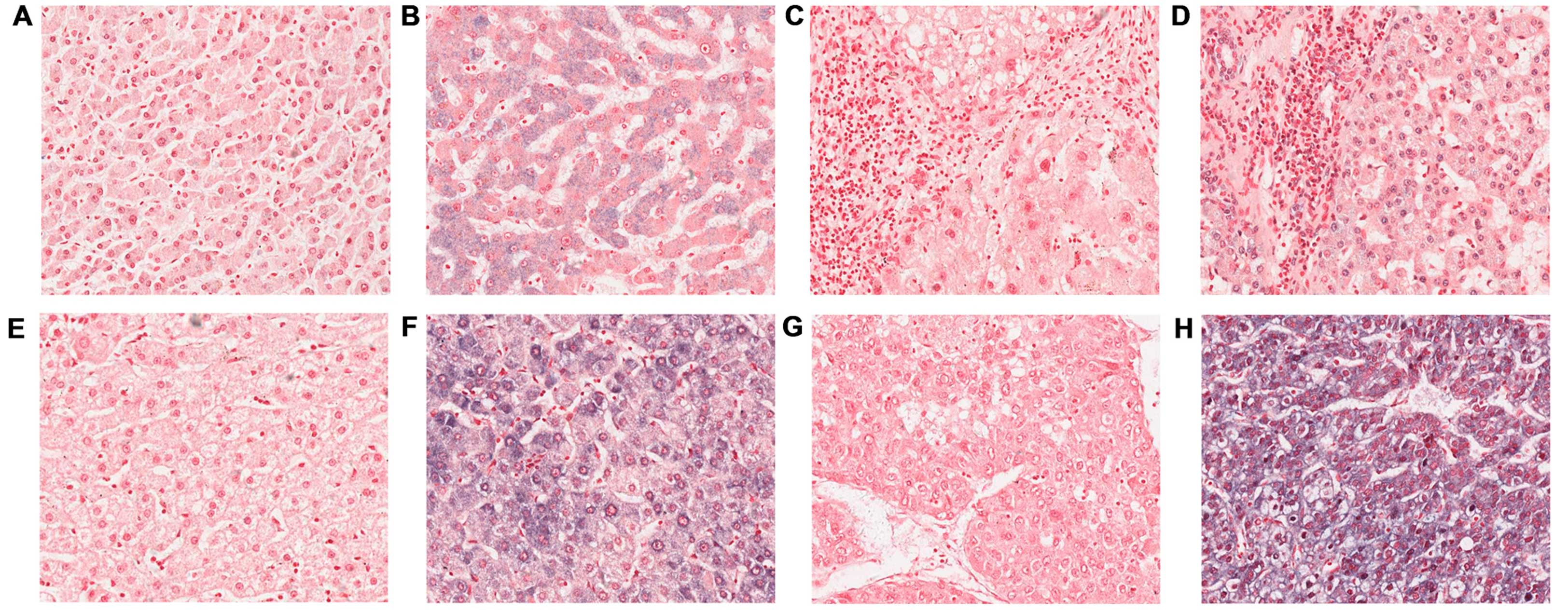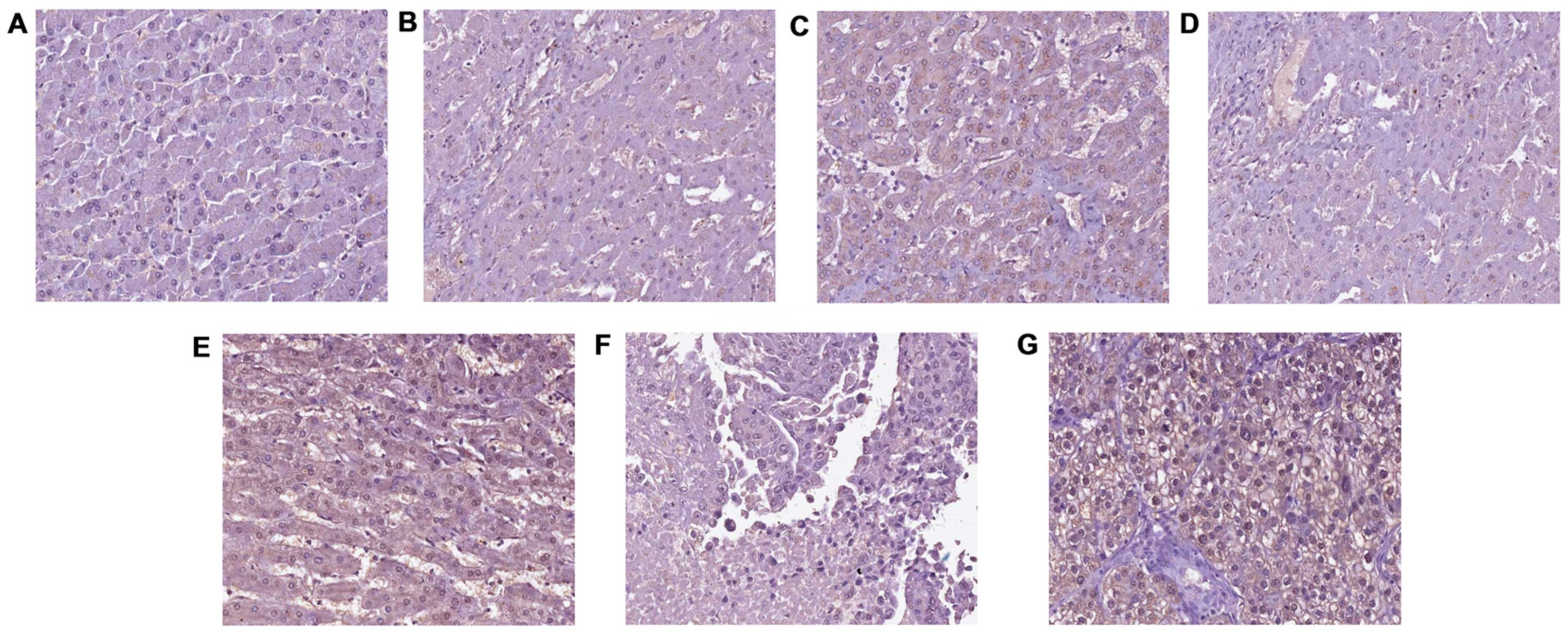|
1
|
El-Serag HB and Rudolph KL: Hepatocellular
carcinoma: Epidemiology and molecular carcinogenesis.
Gastroenterology. 132:2557–2576. 2007. View Article : Google Scholar : PubMed/NCBI
|
|
2
|
Altekruse SF, McGlynn KA and Reichman ME:
Hepatocellular carcinoma incidence, mortality and survival trends
in the United States from 1975 to 2005. J Clin Oncol. 27:1485–1491.
2009. View Article : Google Scholar : PubMed/NCBI
|
|
3
|
Parkin DM, Bray F, Ferlay J and Pisani P:
Global cancer statistics, 2002. CA Cancer J Clin. 55:74–108. 2005.
View Article : Google Scholar : PubMed/NCBI
|
|
4
|
Zhang W, Shu XO, Li H, Yang G, Cai H, Ji
BT, Gao J, Gao YT, Zheng W and Xiang YB: Vitamin intake and liver
cancer risk: A report from two cohort studies in China. J Natl
Cancer Inst. 104:1173–1181. 2012. View Article : Google Scholar : PubMed/NCBI
|
|
5
|
Teo EK and Fock KM: Hepatocellular
carcinoma: An Asian perspective. Dig Dis. 19:263–268. 2001.
View Article : Google Scholar : PubMed/NCBI
|
|
6
|
Zhu AX: Systemic therapy of advanced
hepatocellular carcinoma: How hopeful should we be? Oncologist.
11:790–800. 2006. View Article : Google Scholar : PubMed/NCBI
|
|
7
|
El-Serag HB and Mason AC: Rising incidence
of hepatocellular carcinoma in the United States. N Engl J Med.
340:745–750. 1999. View Article : Google Scholar : PubMed/NCBI
|
|
8
|
Thomas MB and Zhu AX: Hepatocellular
carcinoma: The need for progress. J Clin Oncol. 23:2892–2899. 2005.
View Article : Google Scholar : PubMed/NCBI
|
|
9
|
Shiraha H, Yamamoto K and Namba M: Human
hepatocyte carcinogenesis (review). Int J Oncol. 42:1133–1138.
2013.PubMed/NCBI
|
|
10
|
Hagymási K and Tulassay Z: Epidemiology,
risk factors and molecular pathogenesis of primary liver cancer.
Orv Hetil. 149:541–548. 2008.(In Hungarian). View Article : Google Scholar : PubMed/NCBI
|
|
11
|
Nie X, Zhang B, Li X, Xiang J, Xiao B, Ma
J, Zhou M, Zhu S, Lu H, Gui R, et al: Cloning, expression and
mutation analysis of NOR1, a novel human gene down-regulated in
HNE1 nasopharyngeal carcinoma cell line. J Cancer Res Clin Oncol.
129:410–414. 2003. View Article : Google Scholar : PubMed/NCBI
|
|
12
|
Gui R, Li D, Qi G, Suhad A and Nie X:
Inhibition of Grb2-mediated activation of MAPK signal transduction
suppresses NOR1/CB1954-induced cytotoxicity in the HepG2 cell line.
Oncol Lett. 4:566–570. 2012.PubMed/NCBI
|
|
13
|
Shen CM, Nie XM and Li DQ: Screening of
genes differentially expressed in HepG2 cells transfected with NOR1
gene using DNA microarray. Practical Preventive Medicine.
14:609–611. 2007.(In Chinese).
|
|
14
|
Gu X, Fu M, Ding Y, Ni H, Zhang W, Zhu Y,
Tang X, Xiong L, Li J, Qiu L, et al: TIMP-3 expression associates
with malignant behaviors and predicts favorable survival in HCC.
PLoS One. 9:e1061612014. View Article : Google Scholar : PubMed/NCBI
|
|
15
|
Friedrichs K, Gluba S, Eidtmann H and
Jonat W: Overexpression of p53 and prognosis in breast cancer.
Cancer. 72:3641–3647. 1993. View Article : Google Scholar : PubMed/NCBI
|
|
16
|
Edge SB, Byrd DR, Compton CC, Fritz AG,
Greene FL and Trotti A: AJCC Cancer Staging Manual (7th). Springer.
New York: 2010.
|
|
17
|
Li W, Li X, Wang W, Li X, Tan Y, Yi M,
Yang J, McCarthy JB, Xiong W, Wu M, et al: NOR1 is an HSF1- and
NRF1-regulated putative tumor suppressor inactivated by promoter
hypermethylation in nasopharyngeal carcinoma. Carcinogenesis.
32:1305–1314. 2011. View Article : Google Scholar : PubMed/NCBI
|
|
18
|
Xu Z, Chen L, Leung L, Yen TS, Lee C and
Chan JY: Liver-specific inactivation of the Nrf1 gene in adult
mouse leads to nonalcoholic steatohepatitis and hepatic neoplasia.
Proc Natl Acad Sci USA. 102:4120–4125. 2005. View Article : Google Scholar : PubMed/NCBI
|
|
19
|
Dai C, Whitesell L, Rogers AB and
Lindquist S: Heat shock factor 1 is a powerful multifaceted
modifier of carcinogenesis. Cell. 130:1005–1018. 2007. View Article : Google Scholar : PubMed/NCBI
|
|
20
|
Li W, Li X, Wang W, Yi M, Zhou Y, Zheng P,
Xiong W, Yang J, Peng S, McCarthy JB, et al: Tumor suppressor gene
Oxidored-nitro domain-containing protein 1 regulates nasopharyngeal
cancer cell autophagy, metabolism and apoptosis in vitro. Int J
Biochem Cell Biol. 45:2016–2026. 2013. View Article : Google Scholar : PubMed/NCBI
|
|
21
|
Ouyang J, Wu M, Huang C, Cao L and Li G:
Overexpression of oxidored-nitro domain containing protein 1
inhibits human nasopharyngeal carcinoma and cervical cancer cell
proliferation and induces apoptosis: Involvement of mitochondrial
apoptotic pathways. Oncol Rep. 29:79–86. 2013.PubMed/NCBI
|
|
22
|
Wang W, Li X, Zhang W, Li W, Yi M, Yang J,
Zeng Z, Wanshura Colvin LE, McCarthy JB, Fan S, et al:
Oxidored-nitro domain containing protein 1 (NOR1) expression
suppresses slug/vimentin but not snail in nasopharyngeal carcinoma:
Inhibition of EMT in vitro and in vivo in mice.
Cancer Lett. 348:109–118. 2014. View Article : Google Scholar : PubMed/NCBI
|
|
23
|
Shan Z, Hou Q, Zhang N, Guo L, Zhang X, Ma
Y and Zhou Y: Overexpression of oxidored-nitro domain containing
protein 1 induces growth inhibition and apoptosis in human prostate
cancer PC3 cells. Oncol Rep. 32:1939–1946. 2014.PubMed/NCBI
|
|
24
|
Li YJ, Wang WW and Li DQ: Effect of NOR1
Gene on Level of E-selectin in HepG2 Cells and its Mechanism. The
Practical Journal of Cancer. 25:9–12. 2010.(In Chinese).
|
|
25
|
Perz JF, Armstrong GL, Farrington LA,
Hutin YJ and Bell BP: The contributions of hepatitis B virus and
hepatitis C virus infections to cirrhosis and primary liver cancer
worldwide. J Hepatol. 45:529–538. 2006. View Article : Google Scholar : PubMed/NCBI
|
|
26
|
Davila JA, Morgan RO, Shaib Y, McGlynn KA
and El-Serag HB: Hepatitis C infection and the increasing incidence
of hepatocellular carcinoma: A population-based study.
Gastroenterology. 127:1372–1380. 2004. View Article : Google Scholar : PubMed/NCBI
|
|
27
|
Kanwal F, Hoang T, Kramer JR, Asch SM,
Goetz MB, Zeringue A, Richardson P and El-Serag HB: Increasing
prevalence of HCC and cirrhosis in patients with chronic hepatitis
C virus infection. Gastroenterology. 140:1182–1188. 2011.
View Article : Google Scholar : PubMed/NCBI
|
|
28
|
Xiang B, Wang W, Li W, Li X, Li X and Li
G: Differential expression of oxidored nitro domain containing
protein 1 (NOR1), in mouse tissues and in normal and cancerous
human tissues. Gene. 493:18–26. 2012. View Article : Google Scholar : PubMed/NCBI
|
|
29
|
Xiang B, Yi M, Wang L, Liu W, Zhang W,
Ouyang J, Peng Y, Li W, Yin D, Zhou M, et al: Preparation of
polyclonal antibody specific for NOR1 and detection of its
expression pattern in human tissues and nasopharyngeal carcinoma.
Acta Biochim Biophys Sin (Shanghai). 41:754–762. 2009. View Article : Google Scholar : PubMed/NCBI
|
















